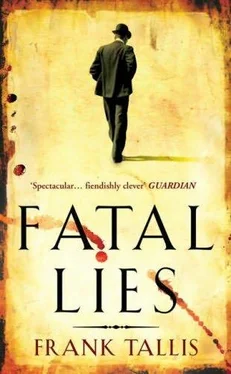Frank Tallis - Fatal Lies
Здесь есть возможность читать онлайн «Frank Tallis - Fatal Lies» весь текст электронной книги совершенно бесплатно (целиком полную версию без сокращений). В некоторых случаях можно слушать аудио, скачать через торрент в формате fb2 и присутствует краткое содержание. Жанр: Исторический детектив, на английском языке. Описание произведения, (предисловие) а так же отзывы посетителей доступны на портале библиотеки ЛибКат.
- Название:Fatal Lies
- Автор:
- Жанр:
- Год:неизвестен
- ISBN:нет данных
- Рейтинг книги:3 / 5. Голосов: 1
-
Избранное:Добавить в избранное
- Отзывы:
-
Ваша оценка:
- 60
- 1
- 2
- 3
- 4
- 5
Fatal Lies: краткое содержание, описание и аннотация
Предлагаем к чтению аннотацию, описание, краткое содержание или предисловие (зависит от того, что написал сам автор книги «Fatal Lies»). Если вы не нашли необходимую информацию о книге — напишите в комментариях, мы постараемся отыскать её.
Fatal Lies — читать онлайн бесплатно полную книгу (весь текст) целиком
Ниже представлен текст книги, разбитый по страницам. Система сохранения места последней прочитанной страницы, позволяет с удобством читать онлайн бесплатно книгу «Fatal Lies», без необходимости каждый раз заново искать на чём Вы остановились. Поставьте закладку, и сможете в любой момент перейти на страницу, на которой закончили чтение.
Интервал:
Закладка:
Rheinhardt shrugged.
“And why are there three sets of cuts?” Liebermann continued. “Surely, an initiation ritual would take place only once?” Liebermann shook his head, as if annoyed by the number of questions that were crowding his mind. “And what on earth are we to make of those crural lacerations-so conspicuously close to the genitals?”
Rheinhardt twisted the horns of his mustache.
“Strange things happen in military schools. Some boys gain extra ordinary power over their peers. I have heard of some cadets ruling over their comrades like tyrants-meting out punishments, extorting levies, devising sadistic games. Perhaps Zelenka was unfortunate enough to have become the victim of one of these juvenile despots.”
Liebermann flicked through the photographs and found an image of Zelenka in the infirmary. It was a close-up of his face. Although his features were square and masculine, there was something in his expression that suggested sensitivity, intelligence.
“I abhor bullying,” said Liebermann, “and it is most distressing to contemplate the depredations of institutional life-the utter misery that some boys must endure; however, Professor Mathias has concluded that Zelenka died of natural causes. The cuts on his body, whatever they represent, and however they got there, are an irrelevance! All that you can do is notify the school of your findings and trust that they will eventually find and expel the culprit. You cannot proceed with a murder investigation, Oskar, if there has not been a murder.”
Rheinhardt sipped his brandy. “But…” The inspector shifted uncomfortably. “I have a feeling…”
Liebermann rolled his eyes.
Rheinhardt continued worrying his mustache. “There's something about this that doesn't smell right.”
“My dear friend, your feelings of unease are very easily explained- and can be attributed to your strong protective instincts. You are resistant to the idea that Zelenka died naturally because of his youth. If you accept that such a thing can happen to him, you must also accept that it can happen to others: namely, your two daughters. Naturally, this is such an awful consideration that a defensive mechanism has come into play. By denying the existence of latent and fatal pathological processes, you experience less anxiety and preserve a comforting illusion. Moreover, if you can prove that Zelenka was murdered, you will vitiate Professor Mathias s conclusions, making it seem even less likely that the same fate could affect your loved ones. But unfortunately, Oskar-the Erlkonig is a reality: a reality not of the spirit world but of the material world. And he comes not in the shape of an elven king but as minute lesions in the brain, and freakish electrical discharges that disturb the beating of a young heart.” Liebermann looked at his friend, and compassion creased the skin around his eyes. “Oskar, I wish that it were otherwise.”
Rheinhardt sighed. “You are right, of course. I dare say there is something in my soul that rages against the death of children-and for the very reasons you so eloquently describe. Be that as it may, I cannot free myself of the gnawing suspicion that there is more to Zelenka's death…” His voice trailed off into uncertainty. Then he added: “I will continue with the investigation, in spite of Professor Mathias's findings.”
Liebermann offered Rheinhardt another cigar. “I very much hope, Oskar, that when the time comes, you will be able to satisfy Commissioner Brugel. He will want to know why the resources of the security office have been used to discover the identity of a… sadistic schoolboy, which I fear may be all that this investigation is destined to reveal.”
Rheinhardt took the cigar and repeated: “I have a feeling.”
9
It was a dull morning: the sky was layered with massy strips of dense gray cloud. Rheinhardt took care as he negotiated the damp cobbles, which descended at a steep angle toward a scrubby waterlogged field. On either side were squat bungalows, the walls of which were mottled and streaked with an algal slime. In the distance, he could see four gas towers: enormous structures that loomed beyond a misty veil of persistent mizzle.
Rheinhardt found the bungalow he was looking for. It was cleaner than its neighbors but was not in good repair (the gutter was leaking). A lever pump was situated just outside the entrance, and a number of metal buckets were hanging in a neat row under the eaves. An empty birdcage-swinging forlornly-had been suspended in a recessed casement.
The door was opened by a woman. She was wearing a simple black dress, and the flesh around her sharp, intelligent eyes looked swollen. She had been crying.
“Frau Meta Zelenka?” The woman nodded. “I am Inspector Rheinhardt.”
“Of course,” she said, dabbing her cheeks with a handkerchief. “I'm sorry-please come in.”
Rheinhardt stepped across the threshold into a dark room that felt oppressively compressed due to its low ceiling. Sitting at a table was a large man with short reddish hair. He wore a brown jacket over a vest, the top buttons of which were undone. On seeing the inspector, the man rose, but very slowly-an uneasy coming together of body parts-such that the simple act of standing appeared to require monumental effort. Rheinhardt noticed the man's hands. They were laborer's hands-oversize, the white knuckles like eggs, the skin leathery, the veins raised and twisted.
“My husband,” said the woman. Her German was nuanced with a Slavic accent. “Fanousek, this is Inspector Rheinhardt.”
The man bowed, although the movement seemed to involve nothing more than a pained hunching of his shoulders.
Beyond the table was a sideboard on which stood a devotional candle and a crucifix.
“Forgive me for intruding on your grief,” said Rheinhardt.
Fanousek lowered himself back into his chair, and Meta drew up a seat beside him. Her slender hand traveled across the surface of the table until it reached her husband's, whereupon his long fingers opened and closed tightly around hers.
“Thank you for agreeing to see me,” said Rheinhardt, sitting opposite the couple. “And please accept my heartfelt condolences.”
“What do you want, Inspector?” said Fanousek. Like Metas, his German was accented; however, the question-although blunt- was not discourteous, merely direct.
“Information. About yourselves-and about Thomas.”
“Why?”
“I must complete a report. For the commissioner.” It was not the precise truth-but it was true enough. Rheinhardt couldn't very well declare, I'm here because of a presentiment, a feeling…
Rheinhardt took out his notebook.
“You are both Czech?”
“Yes.”
“And how long have you been living in Vienna?”
“Ten years.”
Theirs was a typical story-of hardship in rural Bohemia, the promise of prosperity in Vienna, then factory work, and finally disappointment. Fanousek worked in a warehouse. Meta sold cheap rye bread imported from Hungary at a Saturday market.
“With respect,” asked Rheinhardt hesitantly, “how could you afford to send your son to Saint Florian's?”
“We couldn't,” said Meta. “Thomas was awarded a scholarship.”
“Really? How did that happen?”
“Thomas spent a great deal of time in the company of our priest, Father Hanak. He encouraged Thomas, gave him books, even gave him free lessons at the presbytery: Latin, calligraphy, mathematics… Then the good father found out that one of the breweries, one of the Czech breweries, sponsored a place at the oberrealschule for a boy born in Bohemia and”-Meta swallowed her pride and continued- “from an impoverished household.”
Rheinhardt gestured to indicate that the Zelenkas’ pecuniary circumstances, however straitened, were of little consequence as far as he was concerned.
Читать дальшеИнтервал:
Закладка:
Похожие книги на «Fatal Lies»
Представляем Вашему вниманию похожие книги на «Fatal Lies» списком для выбора. Мы отобрали схожую по названию и смыслу литературу в надежде предоставить читателям больше вариантов отыскать новые, интересные, ещё непрочитанные произведения.
Обсуждение, отзывы о книге «Fatal Lies» и просто собственные мнения читателей. Оставьте ваши комментарии, напишите, что Вы думаете о произведении, его смысле или главных героях. Укажите что конкретно понравилось, а что нет, и почему Вы так считаете.












